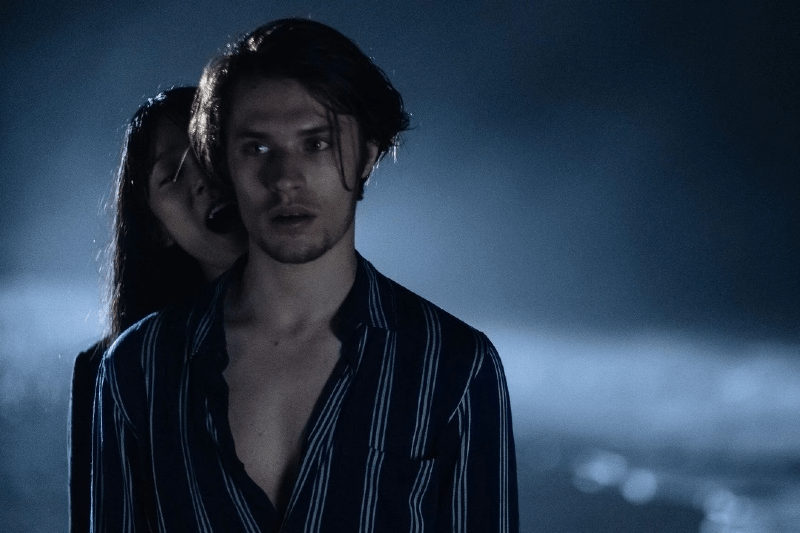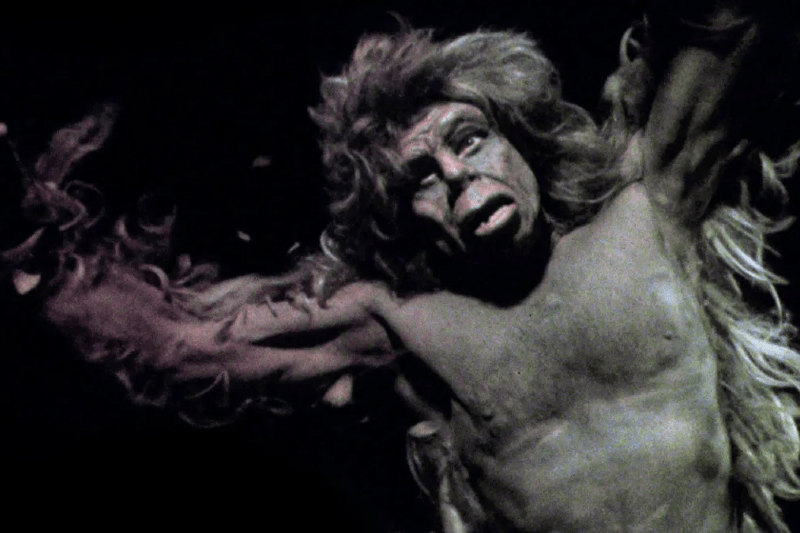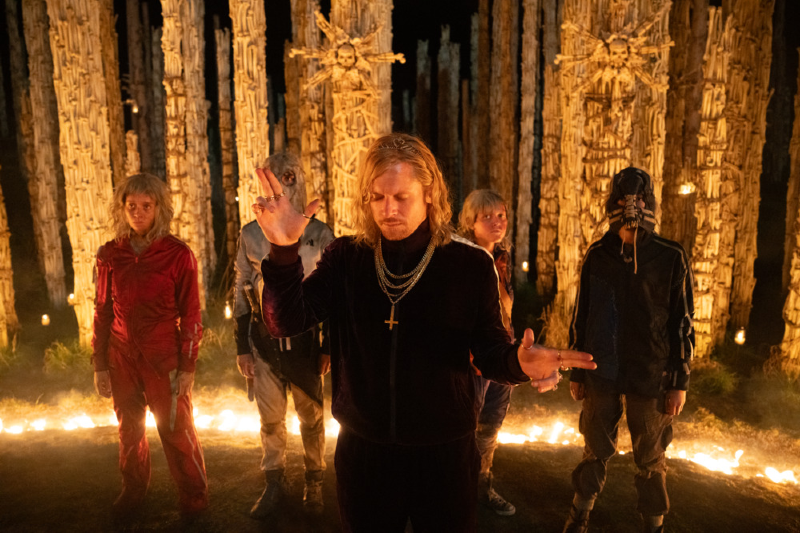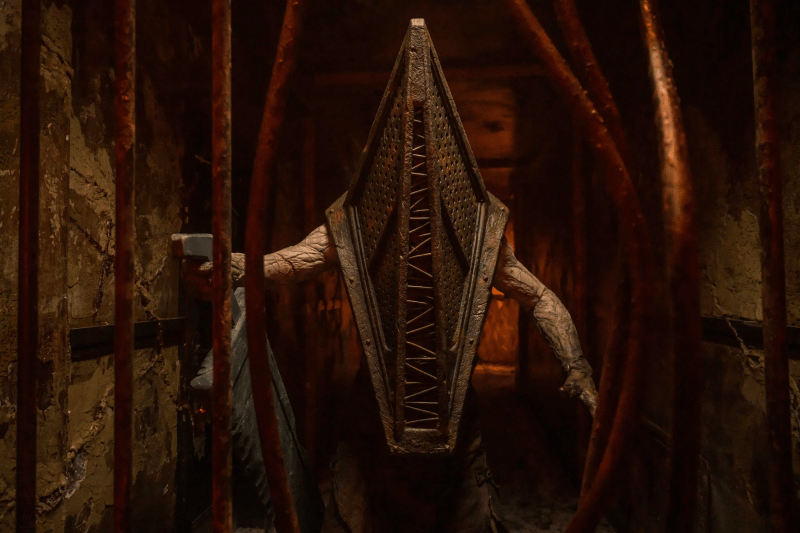The conventions of genre often work to comfort viewers by signaling what outcomes to expect. The killer will be found at the end of a murder mystery. The couple will fall into each other’s arms, in love, by the conclusion of a romantic comedy. The caped crusaders will save the world in the finale of a superhero movie. But genre can also function as a hook, a way to suggest to potential viewers that they might like what a film has to offer. Commonly, a film’s marketing will falsely imply that the product in question aligns with a certain genre to generate interest from a particular demographic. If genre provides structure for one’s expectations, it can be disconcerting, even frustrating, when those expectations aren’t met. Perhaps it’s no surprise, then, that audiences and critics alike seemed to find the 2021 vampire film Dead & Beautiful so unsatisfying.
The marketing certainly played into the film’s misrepresentation of itself as a supernatural horror movie; significantly, Dead & Beautiful received distribution in the U.S. exclusively through Shudder. The general disappointment with Dead & Beautiful can’t simply be ascribed to misleading marketing, however. Writer/director David Verbeek’s latest film is deliberately, entirely built around a genre bait-and-switch. Dead & Beautiful follows an international group of five ultra-wealthy young people, all of whom come from billionaire families. This group uses Taipei, where the film is set, as their playground, setting each other up for elaborate pranks and “experiences.” After a trip into the mountains to witness a shaman perform a ritual ceremony, the group wakes up to discover that they now have fangs. Each member of the group reacts differently to the gradually dawning understanding that they have been transformed into vampires.
The central metaphor of the film is obvious. Verbeek makes this metaphor literal in more ways than one by the end of the movie with quite the twist. It turns out that Lulu (Aviis Zhong), the wealthiest member of the group, had her friends’ teeth filed while they were unconscious to teach them a lesson. Since her father’s suicide when she was a child, Lulu has felt that her and her friends’ lifestyle is indecent. Inspired by a protestor who called her father a vampire in a figurative sense, Lulu decided to force her friends to live this idea out for real. Or, at least, to think they are, since there are no actual undead in Dead & Beautiful. The film, finally, reveals itself as a psychological drama about the definite limits of Lulu’s ambivalence over her enormous fortune. She wants her friends to assuage her guilt, but she’s disinclined to fundamentally change the way she lives her life.
As I watched Dead & Beautiful, I couldn't help but think of two other satirical takes on the ridiculously rich — both HBO shows that hit the zeitgeist and garnered positive critical acclaim last year in a way that Dead & Beautiful failed to do: season three of Succession and Mike White's limited series The White Lotus. Verbeek’s film isn’t a great horror movie, let’s get that out of the way. I would like to make the case, however, that Dead & Beautiful belongs in the cultural conversation with The White Lotus and Succession. It’s a fascinating entry into 2021's run of stories about the filthy rich that blends sympathetic character studies with scathing critique.
Ultimately, all three works are mainly interested in exploring the tragedy of their rich characters’ miserable lives. These works imagine wealth, especially generational wealth, as a prison. This doesn’t mean that any of their characters get let off the hook for their inexcusable behavior, though. These characters uphold the same systems under which they suffer, usually acting monstrously as they cling to their power. These three works sympathize with but do not absolve their protagonists, walking a tonal tightrope. The rich douchebags aren’t punished in any spectacular wish-fulfillment fantasy, but they aren’t humanized antiheroes either. The results in each case can be off-putting, forcing viewers to wonder why we want to spend time with these characters. Each work stands as an interesting case study in how to make art about the wealthy that doesn’t glamorize wealth.
This resistance to glamor characterizes the visual approach of all three works as well. The shaky, handheld camera work on Succession might make you feel ill. The color grading of The White Lotus casts everything in a sickly yellow glow, and the titular resort is filmed in such a way as to emphasize how it confines the series’ characters — even the wealthy ones. The White Lotus isn’t an escape; it’s inescapable. Dead & Beautiful’s glossy, gorgeous shots of Taipei are resolutely inert. The well-appointed spaces in which the film’s ultra-wealthy protagonists move are giant, empty, and lonely. The superficial allure of the film’s fashion-photography imagery mimics the shallowness of its characters’ inner lives.
Intriguingly, all three works use a recognizable genre as a hook only to eventually subvert or abandon these genre trappings. Vampire horror is to Dead & Beautiful what murder mystery is to The White Lotus or what prestige cable drama (or dark comedy, depending on who you ask) is to Succession. I don’t think this is a marketing gimmick. Each work purposefully leverages the moments of slippage between the genre it purports to be and the type of story it really wants to tell. This becomes most pronounced when each work sets its satirical sights on a character who is already self-aware, to a certain extent, of their privilege. All three stories use these moments to dramatize cognitive dissonance.
All three works are concerned, to some extent, with those who are aware of their privilege but have no incentive or meaningful impulse to disrupt existing power structures. Kendall Roy (Jeremy Strong) in Succession, Rachel (Alexandra Daddario) in The White Lotus, and Lulu in Dead & Beautiful all, at one point or another, appear to genuinely believe that they understand the corrosive, corruptive power of wealth. They see clearly, and they want to break free of it. But none of them, for various reasons, can truly come to terms with what giving up their privileged lifestyles would mean.
At the moments when viewers are finally confronted with how these characters’ actions and intentions don’t align, each work pulls off its genre bait-and-switch. The full weight of Rachel’s hypocrisy doesn’t land until The White Lotus’s final episode, when it’s revealed that she is not the murder victim as viewers have been led to assume. The murder doesn’t end up being so important, in the grand scheme of things, because the murderer gets off scot-free. In season three of Succession, the disconnect between what Kendall says he stands for and what he’s actually fighting for manifests in the way that the show tonally undercuts his biggest moments. Kendall urges a late night comedy host to roast him because he’s “in on the joke,” but his uncool eagerness is deeply sad. When Kendall confesses to his siblings at the end of the season that he accidentally murdered someone and let their father cover it up, Shiv (Sarah Snook) and Roman (Kieran Culkin) are so unfazed and unimpressed that the emotional intensity of Kendall’s confession becomes funny.
Dead & Beautiful’s genre subversion comes at the moment of Lulu’s revelation, when the film confirms that no one is actually a vampire. In one of the last scenes of the film, Lulu and her friends celebrate the lessons they supposedly learned. Mason (Gijs Blom), who is playing his own game with Lulu’s head, raises a glass. He toasts to being better than their parents, proposing that he and his friends can somehow be ethical billionaires. This, this, is what Lulu desperately wants to hear. She doesn’t want to give up her lifestyle. She merely wants to be reassured by her friends that she’s not a vampire, just as she’s reassured them.
In the film’s final, provocative scene, Verbeek pulls one last trick. After Lulu realizes the extent to which Mason, her friend and sometime lover, has psychologically manipulated her, she no longer believes the fantasy he’s selling her. She can’t take his proposal, his toast, in good faith anymore. She’s suddenly disabused of the notion that she can be anything but a vampire. So she bites Mason on the neck.
While some found the Dead & Beautiful’s critique of the billionaire clique at its center to be tepid, I found its methods remarkably au courant. Dead & Beautiful’s approach to genre and satire is decidedly of a piece with Succession and The White Lotus. When considered in the company of HBO’s buzziest critical examinations of the wealthy, viewers might find Dead & Beautiful more thought-provoking.







